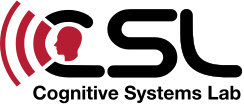 ASK: A Framework for Data Acquisition and Activity Recognition
ASK: A Framework for Data Acquisition and Activity Recognitionby Hui Liu, Tanja Schultz
Abstract:
This work puts forward a framework for the acquisition and processing of biosignals to indicate strain on the knee inflicted by human everyday activities. Such a framework involves the appropriate equipment in devices and sensors to capture factors that inflict strain on the knee, the long-term recording and archiving of corresponding multi-sensory biosignal data, the semi-automatic annotation and segmentation of these data, and the person-dependent or person-adaptive automatic recognition of strain. In this paper we present first steps toward our goal, i.e. person-dependent recognition of a small set of human everyday activities. The focus here is on the fully automatic end-to-end processing from signal input to recognition output. The framework was applied to collect and process a small pilot dataset from one person for a proof-of-concept validation and achieved 97% accuracy in recognizing instances of seven daily activities.
Reference:
ASK: A Framework for Data Acquisition and Activity Recognition (Hui Liu, Tanja Schultz), In Proceedings of the 11th International Joint Conference on Biomedical Engineering Systems and Technologies (BIOSTEC 2018) - Volume 3: BIOSIGNALS, SciTePress, 2018.
Bibtex Entry:
@inproceedings{liu2018har_framework,
title = {{ASK}: A Framework for Data Acquisition and Activity Recognition},
author = {Liu, Hui and Schultz, Tanja},
booktitle = {Proceedings of the 11th International Joint Conference on Biomedical Engineering Systems and Technologies (BIOSTEC 2018) - Volume 3: BIOSIGNALS},
pages = {262--268},
organization = {INSTICC},
publisher = {SciTePress},
year = {2018},
isbn = {978-989-758-279-0},
issn = {2184-4305},
doi = {10.5220/0006732902620268},
url = {https://www.csl.uni-bremen.de/cms/images/documents/publications/LiuSchultz_Biosignals2018.pdf},
abstract = {This work puts forward a framework for the acquisition and processing of biosignals to indicate strain on the knee inflicted by human everyday activities. Such a framework involves the appropriate equipment in devices and sensors to capture factors that inflict strain on the knee, the long-term recording and archiving of corresponding multi-sensory biosignal data, the semi-automatic annotation and segmentation of these data, and the person-dependent or person-adaptive automatic recognition of strain. In this paper we present first steps toward our goal, i.e. person-dependent recognition of a small set of human everyday activities. The focus here is on the fully automatic end-to-end processing from signal input to recognition output. The framework was applied to collect and process a small pilot dataset from one person for a proof-of-concept validation and achieved 97\% accuracy in recognizing instances of seven daily activities.}
}